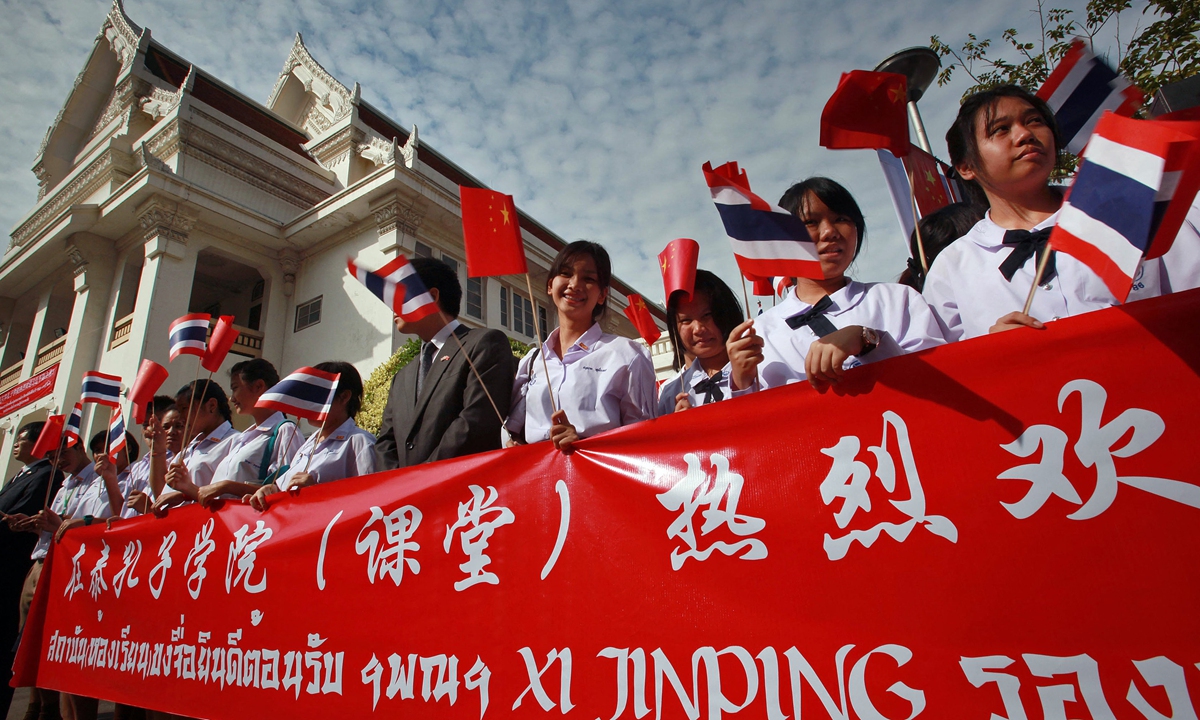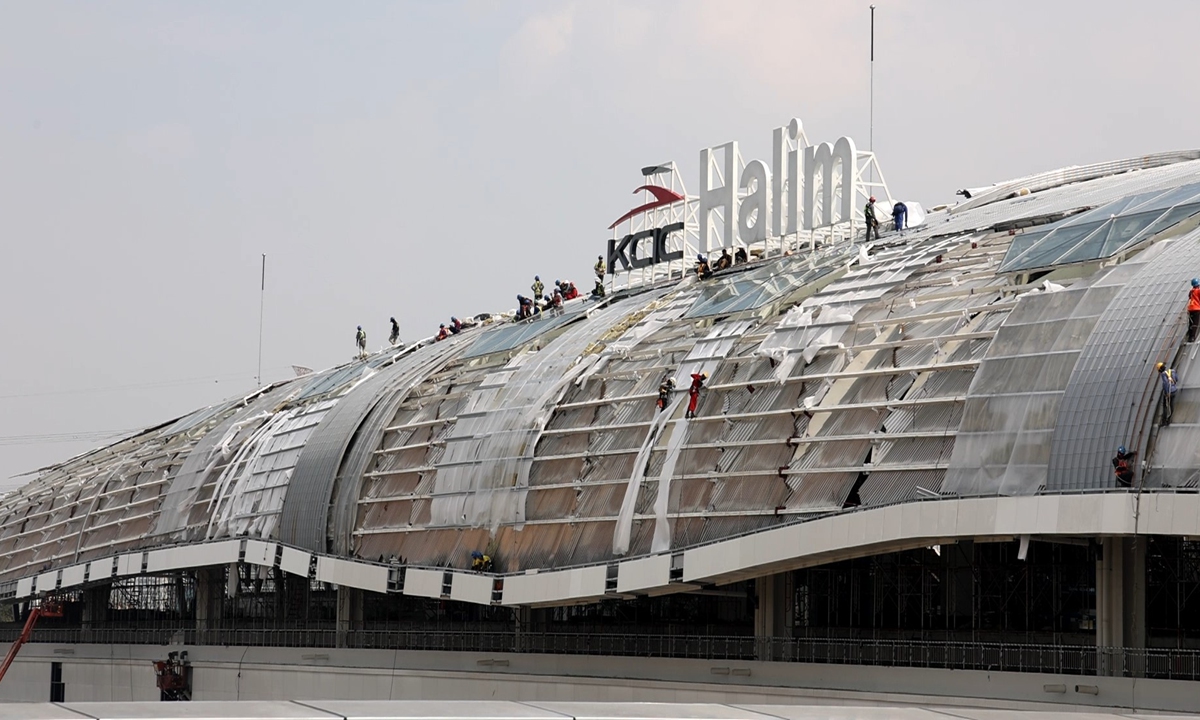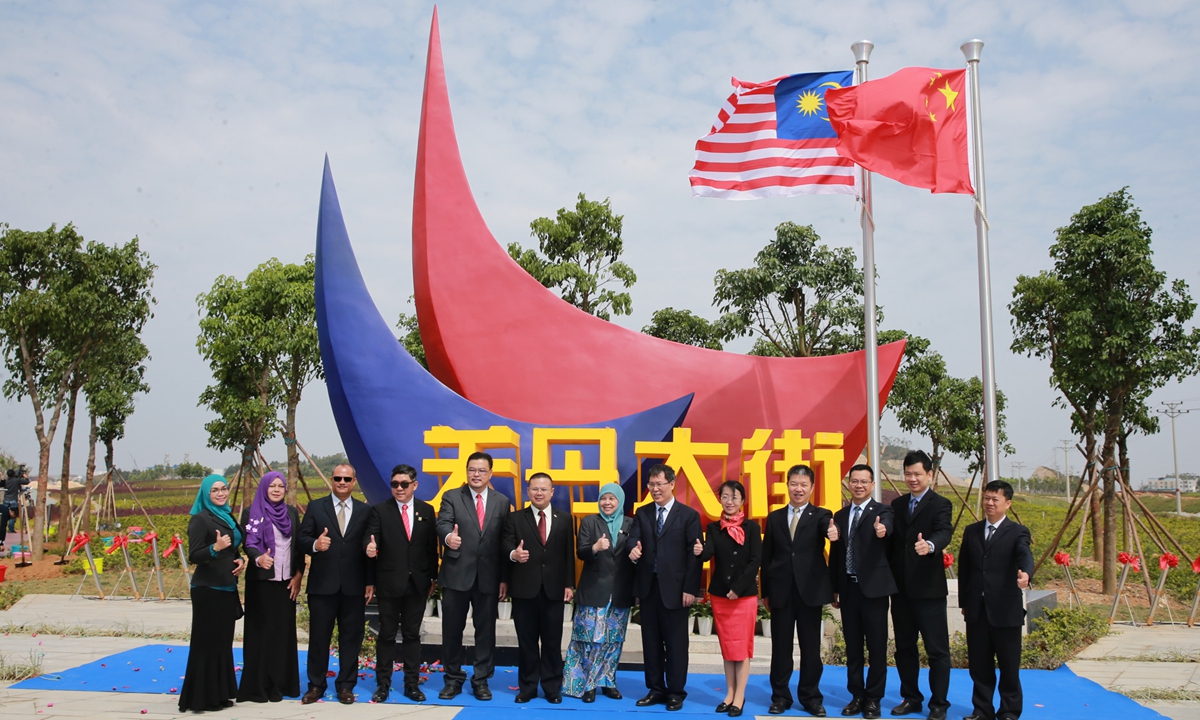IN-DEPTH / IN-DEPTH
Xi's footsteps: Embodying Xi's visions, the China-proposed BRI brings opportunities, benefits to ordinary people in SE Asia
A decade of progress
Editor's Note:
When Chinese President Xi Jinping first proposed the initiative of the 21st Century Maritime Silk Road in 2013, it was framed as a broad vision to expand regional cooperation between China and Southeast Asian countries. By visiting the Belt and Road Initiative (BRI) projects in Indonesia, Thailand and Malaysia in July, Global Times reporters followed Xi's footsteps and visions to find out how BRI projects have enhanced regional connectivity, deepened trade and economic relations, promoted political trust and expanded people-to-people exchanges among member countries.
Just like Xi's vision for "a global community of shared future," like-minded countries in Southeast Asia - united by geography and bonded by mutual interests - are coming together to form a more cohesive bloc.
At a time when the world is undergoing profound changes unseen in a century, the international community has strong expectations for China's voice, role and wisdom.

One ordinary morning 10 years ago, young Indonesian girl Grace Jessica casually flipped through the newspaper and came across news about visiting
Chinese President Xi Jinping and his speech at the Indonesian parliament. She knew little about international relations, but her intuition told her that Xi's visit could bring some "valuable benefits to both countries."
Time proved the young Indonesian's intuition true.
One decade later, the Jakarta-Bandung High-Speed Railway (HSR) has helped Jessica realize her dream of participating in the development and innovation of her motherland. The railway has been a brand-new Belt and Road Initiative (BRI) "calling card" as Indonesia can now boast that it has the first fully operational high-speed railway line in Southeast Asia.
In 2019, Jessica, as a fresh graduate, took a job as an assistant director at the Tegalluar station of the Jakarta-Bandung HSR. It has become a point of pride for her family to see her participate in such an important national infrastructure project.
"Every time when I think back, I feel like my dream started from the moment when Xi delivered a speech at the Indonesia parliament in 2013," she told the Global Times during an interview in Bandung, Indonesia, in July.
On October 3, 2013, President Xi became the first foreign head of state to address the Indonesian House of Representatives upon invitation. Then speaker of the house of representatives Marzuki Alie extended his welcome and vowed to push forward the relations between the two countries to a new high.
In a recent interview with the Global Times, Marzuki recalled that Xi's address was "very significant not only for Indonesia-China relations, but also for international cooperation." He said he believed the BRI was "the most ambitious foreign and economic policy of the Chinese government at the time."
"In his speech, President Xi highlighted the 21st Century Maritime Silk Road as a path of peace and cooperation, openness and inclusivity, mutual learning and mutual benefit. I believe it is essential for the [Indonesian] government to respond to Xi's offer, which, in the next term when President Joko Widodo led it, envisioned Indonesia becoming a 'world maritime axis,'" Marzuki said.
Marzuki highlighted that since the initiative's introduction in 2013, Indonesia's cooperation with China under the BRI has undergone significant development in a variety of disciplines such as infrastructure, trade, investment, tourism and maritime partnerships.
Li Zhuohui, the 85-year-old chief editor of Sin Po, a Peranakan Chinese-language newspaper founded in Indonesia, can still clearly remember the enthusiastic applauses that erupted during Xi's speech at the parliament on the day.
In the view of Li, who listened to the speech at the parliament, the BRI, the concept of a global community of shared future, the Global Development Initiative, the Global Security Initiative and the Global Civilization Initiative are contemporary versions of Datong, or "a world of great harmony," a philosophy that the Chinese people have carried forward for thousands of years.
The vision of "a world of great harmony" was inherited and reflected in Xi's speeches at the G20 in Indonesia and APEC in Thailand in November 2022, when Xi outlined a blueprint for global development with the principles of being "more inclusive," "beneficial to all" and "more resilient."
During Xi's visit to Indonesia in 2022, Xi and Widodo inspected via video link the inauguration of the trial operation of the Jakarta-Bandung HSR. It marked a milestone achievement for the Jakarta-Bandung HSR and was a remarkable embodiment of the China-Indonesia community of shared future, capable of significantly driving the integration of Indonesia's regional economy.
As the first high-speed railway in the history of Indonesia, also the first in Southeast Asia, the Jakarta-Bandung HSR was a dream that many local Indonesians like Jessica could not have dared to hope for just 10 years ago.

Footsteps kick off trade
In 2023, in the context of a global slowdown and the risk of increasing fragmentation of globalization, Asia is anticipated to accelerate its pace of overall economic growth, and will continue to advance regional production, trade, investment and financial integration and cohesion, and seize the "Asian moment" for global economic governance.
Such positive hopes shed a light on what Xi claimed at the APEC CEO Summit in Indonesia on October 7, 2013 that "China cannot develop without the Asia-Pacific and the Asia-Pacific cannot prosper without China."
What Xi said in 2013 has been confirmed over the following decade, as the core development concepts of some Southeast Asian countries are blending with China's.
In January 2023, Malaysian Prime Minister Anwar Ibrahim unveiled a new policy direction for his country called the "Madani Way," the Malay acronym for "Sustainability, Care & Compassion, Respect, Innovation, Prosperity, and Trust," which seeks to address the country's inequalities in terms of ethnicity, religion, regions and other issues.
"The concept of the 'Madani Way' resonates with Xi's idea of 'a global community of shared future.' Both aim to achieve comprehensive and sustainable development that benefits all people, regardless of race, class, or belief," Abdul Majid Ahmad Khan, Malaysia's former ambassador to China from 1998 to 2005, said in an interview with the Global Times in Malaysia.
Under the guidance of President Xi's development philosophy centered on the people, China actively participates in projects such as the East Coast Rail Link and the Kuantan Industrial Park in Malaysia, helping Malaysia achieve a more equitable and balanced development.
This strategic cooperation undoubtedly promotes mutual benefit between Malaysia and China, Majid noted.
In 2014, Xi called for the two countries to build industrial parks in China's Qinzhou and Malaysia's Kuantan as flagship projects for China-Malaysia cooperation and models for China-ASEAN (Association of Southeast Asian Nations) cooperation.
And as of April 2023, the Malaysia-China Kuantan Industrial Park has signed 12 projects with an agreed investment of 46 billion yuan ($6.3 billion).
In July, when a team of Global Times reporters visited the Kuantan Industrial Park and Kuantan Port, they witnessed readily the vitality behind the trade of goods. The cranes stood tall, the containers were neatly arranged, and newly arrived materials such as iron ore and coke were stacked in an orderly manner. With the joint efforts of China and Malaysia, the Kuantan Port with a history of more than 40 years was ushering in a new phase of vitality.
The booming trade seems to echo Xi's appeal at the G20 Summit in Indonesia in 2022 that "No one should engage in beggar-thy-neighbor practices, building 'a small yard with high fences'."

Heightened exchanges boost closer ties
For many young people in Thailand, Indonesia and Malaysia, each and every one of Xi's visits is an important window for them to understand China's culture and development philosophy, and a chance to further eliminate misunderstandings.
The people-to-people friendship between China and Southeast Asian countries has been further enhanced after each visit by the Chinese leader, as tourism, scholars and student exchanges and art exchanges have continued to intensify over the past decade.
On December 24, 2011, as China's vice president at that time, Xi visited the Confucius Institute at Chulalongkorn University, Thailand, and stressed that China and Thailand are close neighbors with a history of more than 1,000 years of friendly contact.
It is the common aspiration of the Chinese and Thai people that "China and Thailand are kith and kin" and their common desire to carry on the friendship from generation to generation, Xi said.
Xi pointed out that cultural exchanges are the important link to enhance the mutual understanding among people. He hoped that the Confucius Institutes at Chulalongkorn and other Thai universities make full use of the role of Confucius Institute as the platform of comprehensive cultural exchanges to make new contributions to increasing the understanding and friendship between the Chinese and Thai people, promoting the equal cooperation and mutual benefit between China and Thailand and advancing learning among human civilization, the Xinhua News Agency reported in 2011.
In July, the Global Times visited the Confucius Institute at Chulalongkorn University. It was clear that Xi's earnest request had been fulfilled amid the "Chinese fever" of young Thai people.
As the first country in the world to incorporate Chinese into its national education system, Thailand currently has more than 2,000 primary and secondary schools offering Chinese courses and more than 1 million students learning Chinese in schools, accounting for about 60 percent of the total number of students learning Chinese in schools in Southeast Asia, ranking it first in the world.
The Confucius Institute at Chulalongkorn University, established in 2007, promotes understanding of Chinese languages and Chinese culture in Thai society through various activities such as Chinese language teaching, Chinese culture research and local teacher training.
Han Shenglong, the Chinese head of the Confucius Institute at Chulalongkorn University, told the Global Times that in Thailand Chinese has gradually replaced Japanese as the second largest foreign language after English.
Currently, there are 17 Confucius Institutes in Thailand. At its peak, there were over 2,000 Chinese teachers and volunteers teaching Chinese in Thailand. In fact, the Thai government has increasingly realized the importance of promoting Chinese education, according to Han.
In recent years, with the deepening integration of China's and Thailand's economic strategies, educational exchanges between the two countries have entered a new phase.
Han said that Chinese language teaching in Thailand has become more practical nowadays, aiming to cultivate Chinese language talents who can work in industries such as high-speed rail, logistics, tourism, and e-commerce.
Majid told the Global Times that more opportunities for exchanges are expected to allow more individuals, especially youngsters, to witness an objective and authentic China in order to eliminate misunderstandings.
The Malaysia-China Friendship Association chaired by Majid has also translated some of President Xi's speeches into the Malay language, and it intends to work on a production of a special film about the Silk Road in Northwest China. The veteran Malaysian diplomat expects the cultural exchanges amid the strong political and diplomatic foundation between the two sides will be heightened.
When Chinese President Xi Jinping first proposed the initiative of the 21st Century Maritime Silk Road in 2013, it was framed as a broad vision to expand regional cooperation between China and Southeast Asian countries. By visiting the Belt and Road Initiative (BRI) projects in Indonesia, Thailand and Malaysia in July, Global Times reporters followed Xi's footsteps and visions to find out how BRI projects have enhanced regional connectivity, deepened trade and economic relations, promoted political trust and expanded people-to-people exchanges among member countries.
Just like Xi's vision for "a global community of shared future," like-minded countries in Southeast Asia - united by geography and bonded by mutual interests - are coming together to form a more cohesive bloc.
At a time when the world is undergoing profound changes unseen in a century, the international community has strong expectations for China's voice, role and wisdom.

Local students warmly welcome Xi Jinping to the Confucius Institute at Chulalongkorn University in Bangkok, Thailand, on December 24, 2011. Photo: AFP
One ordinary morning 10 years ago, young Indonesian girl Grace Jessica casually flipped through the newspaper and came across news about visiting
Chinese President Xi Jinping and his speech at the Indonesian parliament. She knew little about international relations, but her intuition told her that Xi's visit could bring some "valuable benefits to both countries."
Time proved the young Indonesian's intuition true.
One decade later, the Jakarta-Bandung High-Speed Railway (HSR) has helped Jessica realize her dream of participating in the development and innovation of her motherland. The railway has been a brand-new Belt and Road Initiative (BRI) "calling card" as Indonesia can now boast that it has the first fully operational high-speed railway line in Southeast Asia.
In 2019, Jessica, as a fresh graduate, took a job as an assistant director at the Tegalluar station of the Jakarta-Bandung HSR. It has become a point of pride for her family to see her participate in such an important national infrastructure project.
"Every time when I think back, I feel like my dream started from the moment when Xi delivered a speech at the Indonesia parliament in 2013," she told the Global Times during an interview in Bandung, Indonesia, in July.
On October 3, 2013, President Xi became the first foreign head of state to address the Indonesian House of Representatives upon invitation. Then speaker of the house of representatives Marzuki Alie extended his welcome and vowed to push forward the relations between the two countries to a new high.
In a recent interview with the Global Times, Marzuki recalled that Xi's address was "very significant not only for Indonesia-China relations, but also for international cooperation." He said he believed the BRI was "the most ambitious foreign and economic policy of the Chinese government at the time."
"In his speech, President Xi highlighted the 21st Century Maritime Silk Road as a path of peace and cooperation, openness and inclusivity, mutual learning and mutual benefit. I believe it is essential for the [Indonesian] government to respond to Xi's offer, which, in the next term when President Joko Widodo led it, envisioned Indonesia becoming a 'world maritime axis,'" Marzuki said.
Marzuki highlighted that since the initiative's introduction in 2013, Indonesia's cooperation with China under the BRI has undergone significant development in a variety of disciplines such as infrastructure, trade, investment, tourism and maritime partnerships.
Li Zhuohui, the 85-year-old chief editor of Sin Po, a Peranakan Chinese-language newspaper founded in Indonesia, can still clearly remember the enthusiastic applauses that erupted during Xi's speech at the parliament on the day.
In the view of Li, who listened to the speech at the parliament, the BRI, the concept of a global community of shared future, the Global Development Initiative, the Global Security Initiative and the Global Civilization Initiative are contemporary versions of Datong, or "a world of great harmony," a philosophy that the Chinese people have carried forward for thousands of years.
The vision of "a world of great harmony" was inherited and reflected in Xi's speeches at the G20 in Indonesia and APEC in Thailand in November 2022, when Xi outlined a blueprint for global development with the principles of being "more inclusive," "beneficial to all" and "more resilient."
During Xi's visit to Indonesia in 2022, Xi and Widodo inspected via video link the inauguration of the trial operation of the Jakarta-Bandung HSR. It marked a milestone achievement for the Jakarta-Bandung HSR and was a remarkable embodiment of the China-Indonesia community of shared future, capable of significantly driving the integration of Indonesia's regional economy.
As the first high-speed railway in the history of Indonesia, also the first in Southeast Asia, the Jakarta-Bandung HSR was a dream that many local Indonesians like Jessica could not have dared to hope for just 10 years ago.

The outside of Halim station, the starting point of the Jakarta-Bandung high-speed railway, in Jakarta, the capital of Indonesia Photo: Li Xuanmin/GT
Footsteps kick off trade
In 2023, in the context of a global slowdown and the risk of increasing fragmentation of globalization, Asia is anticipated to accelerate its pace of overall economic growth, and will continue to advance regional production, trade, investment and financial integration and cohesion, and seize the "Asian moment" for global economic governance.
Such positive hopes shed a light on what Xi claimed at the APEC CEO Summit in Indonesia on October 7, 2013 that "China cannot develop without the Asia-Pacific and the Asia-Pacific cannot prosper without China."
What Xi said in 2013 has been confirmed over the following decade, as the core development concepts of some Southeast Asian countries are blending with China's.
In January 2023, Malaysian Prime Minister Anwar Ibrahim unveiled a new policy direction for his country called the "Madani Way," the Malay acronym for "Sustainability, Care & Compassion, Respect, Innovation, Prosperity, and Trust," which seeks to address the country's inequalities in terms of ethnicity, religion, regions and other issues.
"The concept of the 'Madani Way' resonates with Xi's idea of 'a global community of shared future.' Both aim to achieve comprehensive and sustainable development that benefits all people, regardless of race, class, or belief," Abdul Majid Ahmad Khan, Malaysia's former ambassador to China from 1998 to 2005, said in an interview with the Global Times in Malaysia.
Under the guidance of President Xi's development philosophy centered on the people, China actively participates in projects such as the East Coast Rail Link and the Kuantan Industrial Park in Malaysia, helping Malaysia achieve a more equitable and balanced development.
This strategic cooperation undoubtedly promotes mutual benefit between Malaysia and China, Majid noted.
In 2014, Xi called for the two countries to build industrial parks in China's Qinzhou and Malaysia's Kuantan as flagship projects for China-Malaysia cooperation and models for China-ASEAN (Association of Southeast Asian Nations) cooperation.
And as of April 2023, the Malaysia-China Kuantan Industrial Park has signed 12 projects with an agreed investment of 46 billion yuan ($6.3 billion).
In July, when a team of Global Times reporters visited the Kuantan Industrial Park and Kuantan Port, they witnessed readily the vitality behind the trade of goods. The cranes stood tall, the containers were neatly arranged, and newly arrived materials such as iron ore and coke were stacked in an orderly manner. With the joint efforts of China and Malaysia, the Kuantan Port with a history of more than 40 years was ushering in a new phase of vitality.
The booming trade seems to echo Xi's appeal at the G20 Summit in Indonesia in 2022 that "No one should engage in beggar-thy-neighbor practices, building 'a small yard with high fences'."

The China-Malaysia Qinzhou Industrial Park holds the opening ceremony for "Kuantan Avenue" on March 21, 2018, to celebrate China's Qinzhou and Malaysia's Kuantan as flagship cities for China-Malaysia industrial cooperation. Photo: VCG
Heightened exchanges boost closer ties
For many young people in Thailand, Indonesia and Malaysia, each and every one of Xi's visits is an important window for them to understand China's culture and development philosophy, and a chance to further eliminate misunderstandings.
The people-to-people friendship between China and Southeast Asian countries has been further enhanced after each visit by the Chinese leader, as tourism, scholars and student exchanges and art exchanges have continued to intensify over the past decade.
On December 24, 2011, as China's vice president at that time, Xi visited the Confucius Institute at Chulalongkorn University, Thailand, and stressed that China and Thailand are close neighbors with a history of more than 1,000 years of friendly contact.
It is the common aspiration of the Chinese and Thai people that "China and Thailand are kith and kin" and their common desire to carry on the friendship from generation to generation, Xi said.
Xi pointed out that cultural exchanges are the important link to enhance the mutual understanding among people. He hoped that the Confucius Institutes at Chulalongkorn and other Thai universities make full use of the role of Confucius Institute as the platform of comprehensive cultural exchanges to make new contributions to increasing the understanding and friendship between the Chinese and Thai people, promoting the equal cooperation and mutual benefit between China and Thailand and advancing learning among human civilization, the Xinhua News Agency reported in 2011.
In July, the Global Times visited the Confucius Institute at Chulalongkorn University. It was clear that Xi's earnest request had been fulfilled amid the "Chinese fever" of young Thai people.
As the first country in the world to incorporate Chinese into its national education system, Thailand currently has more than 2,000 primary and secondary schools offering Chinese courses and more than 1 million students learning Chinese in schools, accounting for about 60 percent of the total number of students learning Chinese in schools in Southeast Asia, ranking it first in the world.
The Confucius Institute at Chulalongkorn University, established in 2007, promotes understanding of Chinese languages and Chinese culture in Thai society through various activities such as Chinese language teaching, Chinese culture research and local teacher training.
Han Shenglong, the Chinese head of the Confucius Institute at Chulalongkorn University, told the Global Times that in Thailand Chinese has gradually replaced Japanese as the second largest foreign language after English.
Currently, there are 17 Confucius Institutes in Thailand. At its peak, there were over 2,000 Chinese teachers and volunteers teaching Chinese in Thailand. In fact, the Thai government has increasingly realized the importance of promoting Chinese education, according to Han.
In recent years, with the deepening integration of China's and Thailand's economic strategies, educational exchanges between the two countries have entered a new phase.
Han said that Chinese language teaching in Thailand has become more practical nowadays, aiming to cultivate Chinese language talents who can work in industries such as high-speed rail, logistics, tourism, and e-commerce.
Majid told the Global Times that more opportunities for exchanges are expected to allow more individuals, especially youngsters, to witness an objective and authentic China in order to eliminate misunderstandings.
The Malaysia-China Friendship Association chaired by Majid has also translated some of President Xi's speeches into the Malay language, and it intends to work on a production of a special film about the Silk Road in Northwest China. The veteran Malaysian diplomat expects the cultural exchanges amid the strong political and diplomatic foundation between the two sides will be heightened.



